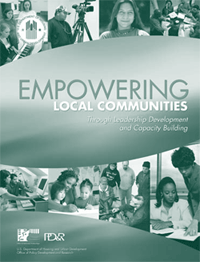April 2008
In this Issue
Are Subdivision Requirements Excessive?
Involving Consumers in Home Energy Management
What Do Grandfamilies Need?
Fostering Local Leadership
In the next issue of ResearchWorks
Fostering Local Leadership
HUD's Office of University Partnerships (OUP) encourages its grantees to pursue initiatives to strengthen community leaders today and to build capacity for the future. Through interviews with grantees, local residents, and leaders of local community-based organizations (CBOs), OUP found that these efforts are bearing fruit, as described in the new report Empowering Local Communities Through Leadership Development and Capacity Building. The report profiles successful CBO efforts at colleges and universities across the country, featuring five initiatives that teach leadership skills to community residents and five efforts to build the capacity of CBOs. As these highly committed OUP partners seek to fulfill OUP's goals in their communities, they are building stronger cities, colleges, and universities.
Building Leadership Skills
 Teaching residents and organizations how to develop relationships with partners is a key aspect of OUP grantees’ efforts to strengthen local leadership. For instance, Lisa Knickmeyer, a graduate student at the University of Maryland, Baltimore, built on relationships established during her internship to develop a center for victims of domestic violence in her neighborhood. The successful center now relies on these many ongoing partnerships.
Teaching residents and organizations how to develop relationships with partners is a key aspect of OUP grantees’ efforts to strengthen local leadership. For instance, Lisa Knickmeyer, a graduate student at the University of Maryland, Baltimore, built on relationships established during her internship to develop a center for victims of domestic violence in her neighborhood. The successful center now relies on these many ongoing partnerships.
The role of partnerships is an important aspect of the leadership courses that some OUP grantees offer to community residents. For example, the residents of Washington's Yakima Valley who participated in Heritage University's Public Leadership and Civic Engagement Academy explained to OUP researchers that the relationships they forged with local community development leaders were the highlight of their seven-month program. Now these relationships are helping Yakima Valley's newest leaders form long-term partnerships to improve the community.
This OUP grant has fostered new relationships and encouraged young people to aspire to be community leaders. Lance Garner, a high school student enrolled in Hawaii Community College's program for at-risk teens, learned to respect other adults and his own leadership qualities as the program teachers showed him respect. The healing power of relationships is also evinced by the Tennessee State University students who serve as role models for inner-city children in afterschool programs at the Friendship Community Outreach Center in Nashville. The children are inspired to improve their behavior based on their relationships with the college student leaders, and they have begun to see the value of going to college.
OUP grantees are helping maintain and strengthen leadership skills. For example, the leadership training that Southern University in Shreveport, Louisiana provides to the Shreveport Housing Authority’s Resident Advisory Board helps longtime board members refresh the sense of personal mission that first spurred them to become leaders.
Building Capacity
Capacity building is a challenging process, because it means giving resources to an often-struggling organization and then patiently assisting, but not interfering, as it tries to move forward on its own. Many of the OUP grantees featured in the report have found that capacity building means recognizing that an organization might not thrive, even with all the assistance that the grantee can give. Nevertheless, grantees play a crucial role in building capacity, rather than taking over when an organization faces challenges.
This role is particularly well-illustrated by Santa Ana College in California, which sponsors a Microenterprise Center for Child Care Providers with funds from its Hispanic-Serving Institutions Assisting Communities (HSIAC) grant. When Gloria Guzman, the codirector for this grant, was asked to serve as president of a new association of Spanish-speaking child-care providers, she instead offered to help the association’s members build their own capacity. Guzman has spent six years helping the association formally organize and become self-sufficient.
A key resource for capacity building is information about a community’s assets and challenges, which institutions of higher education are well equipped to supply to CBOs. For instance, University of Pittsburgh students supplied information to Hazelwood Initiative, Inc. that dramatically improved its capacity to develop a work plan, receive funds to hire an executive director, and pursue its mission to be a catalyst for fostering a healthy community.
Another important aspect of capacity building is targeted research on local issues, which OUP’s Community Development Work Study Program (CDWSP) and Doctoral Dissertation Research Grant (DDRG) grantees can provide. To illustrate, DDRG grantee Ryan Allen of the Massachusetts Institute of Technology helped the Maine Department of Labor and Catholic Charities Maine study how refugees could supplement the state’s aging labor force. Research by CDWSP grantee Jackie Tsou, conducted while in graduate school at the University of California, Berkeley, is enabling CBOs in Richmond, California to pursue a green economic development strategy for low-income residents.
The provision of services and benefits also contributes to capacity building, particularly by creating goodwill among an institution of higher education and its community partners. For example, the grant resource office at Otero Junior College in La Junta, Colorado offers technical assistance to nonprofit organizations. This was established in May 2006 with funds from a HUD HSIAC grant. The office has helped community groups obtain more than $100,000 in grant funds, thereby building local capacity and laying a foundation for future cooperation with these partners.
An Opportunity To Replicate Success
Empowering Local Communities Through Leadership Development and Capacity Building offers both inspiration and practical approaches to developing and managing leadership development and capacity-building initiatives, and it provides contact information for the people responsible for the featured initiatives, so that readers can learn more about how to replicate them. The complete report can be downloaded at no cost at www.oup.org/files/pubs/empowerment.pdf. For additional information on all OUP activities, visit www.oup.org.

